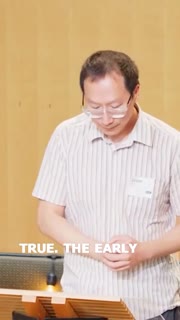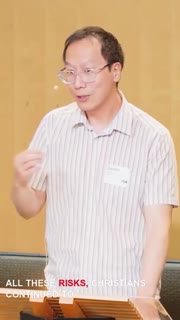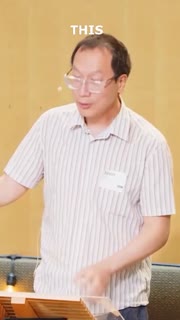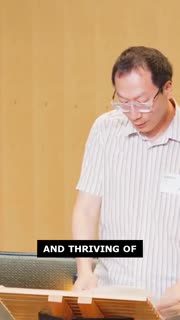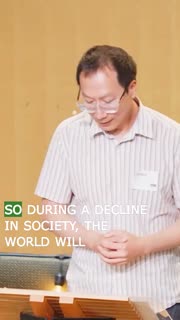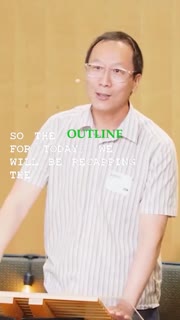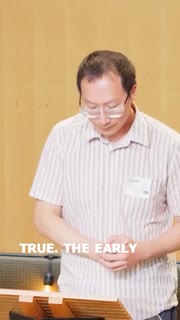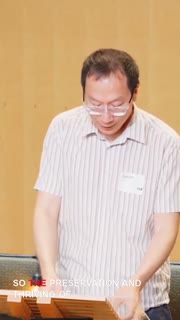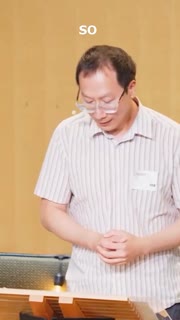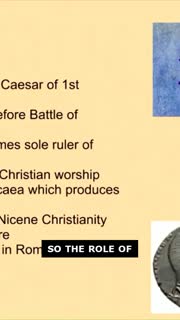Resilience and Wisdom: The Church Through History
Devotional
Sermon Summary
Bible Study Guide
Sermon Clips
### Quotes for Outreach
1. "So the early church was small and under persecution by Roman emperors, and it could have stayed that way. Christianity could have been a small movement, but not influential. Or people could have given into the persecution and abandoned Christianity. But we know that God preserves the church, and he preserves the world. So God cares about the church, cares about our world and world events, and has an active role in shaping history." [17:58] (24 seconds)
2. "Despite all these risks, Christians continued to meet secretly for worship, and many chose martyrdom at this time, rather than renouncing their faith. So in the next slide, this brings me to my first point, that God preserves. Jesus' promise from Acts 1-8 was for his disciples to be witnesses in Jerusalem, in Judea, in Samaria, to the ends of the earth. This promise is from Jesus and will come true." [16:28] (31 seconds)
3. "So during this time, monks were some of the only people who were literate, who could read and write. And so they took a large role in that. They played a huge role in educating the local people. Monks were expected to read the Bible, read ancient literature. They copied the scriptures, the manuscripts, the texts. So they kept these alive for hundreds of years until the Renaissance in the 14th century." [43:40] (22 seconds)
4. "So the preservation and thriving of monasteries during the medieval times were largely characterized by the order that St. Benedict and St. Scholastica founded. Now on the next slide, if you are interested in knowing more about monastic life, I've listed a couple of resources." [47:18] (19 seconds)
5. "So during a decline in society, the world will depend on communities that have been formed into the virtual world. A virtuous life for the world, like the Benedictine monasteries during the medieval period. The world will depend on the church, will depend on Granville Chapel, to have a desire to form people as disciples in the world and build communities that engage the world. Communities that embody biblical wisdom, that sustain new life, that model virtue for the world, to preserve us through the new dark ages." [55:11] (33 seconds)
### Quotes for Members
1. "So the outline for today, we will be recapping the Book of Acts. So just going through the Book of Acts as a reminder, just very quickly towards the end of Scripture. And then we'll be talking about the patristic and medieval church history period. So this is the period of time from the 100s to the Renaissance, so around the 14th century. And we'll talk about the major church developments that happened during that period of time. And then we'll talk about monasticism, which is one of the major developments during this period. Monasticism is an incredible influence during this time. And then we'll actually practice a small monastic exercise towards the end of this sermon." [04:36] (43 seconds)
2. "So the early church was small and under persecution by Roman emperors, and it could have stayed that way. Christianity could have been a small movement, but not influential. Or people could have given into the persecution and abandoned Christianity. But we know that God preserves the church, and he preserves the world. So God cares about the church, cares about our world and world events, and has an active role in shaping history. So God sustained the early church and shaped its resilience and commitment to faith, even in the face of adversity. From the Gospels, to Acts, to Nero, to Diocletian, even to today. So we put our faith in the fact that God cares about the church at all times and everywhere, such that not even the gates of Hades will overcome it." [17:58] (49 seconds)
3. "So the preservation and thriving of monasteries during the medieval times were largely characterized by the order that St. Benedict and St. Scholastica founded. Now on the next slide, if you are interested in knowing more about monastic life, I've listed a couple of resources. So the first is The Nun's Story, starring Audre Lorde. This is Audrey Hepburn from 1959. So this movie is fictional, but it's based on a true story of the life of a nun named Marie Hebert, who struggled with her religious vows after World War II." [47:18] (37 seconds)
4. "So during a decline in society, the world will depend on communities that have been formed into the virtual world. A virtuous life for the world, like the Benedictine monasteries during the medieval period. The world will depend on the church, will depend on Granville Chapel, to have a desire to form people as disciples in the world and build communities that engage the world. Communities that embody biblical wisdom, that sustain new life, that model virtue for the world, to preserve us through the new dark ages." [55:11] (33 seconds)
5. "So the role of Christianity dramatically changed under Constantine. So Constantine was a son of Constantius, who was the Caesar of the Western Roman Empire of the First Tetrarchy. So when Constantius became the emperor, he sent his son Constantine to the Eastern Roman Empire to be trained. And Constantine, after he was trained, and he did not get appointed to be Caesar. So this didn't go well with Constantine. So he came back to the Western Roman Empire, raised an army, and then marched on Rome. And he was begrudgingly acknowledged as a Caesar. But this wasn't enough. So Constantine wanted to be emperor, and so he continued to fight battles." [19:43] (51 seconds)
Ask a question about this sermon
1. "So the early church was small and under persecution by Roman emperors, and it could have stayed that way. Christianity could have been a small movement, but not influential. Or people could have given into the persecution and abandoned Christianity. But we know that God preserves the church, and he preserves the world. So God cares about the church, cares about our world and world events, and has an active role in shaping history." [17:58] (24 seconds)
2. "Despite all these risks, Christians continued to meet secretly for worship, and many chose martyrdom at this time, rather than renouncing their faith. So in the next slide, this brings me to my first point, that God preserves. Jesus' promise from Acts 1-8 was for his disciples to be witnesses in Jerusalem, in Judea, in Samaria, to the ends of the earth. This promise is from Jesus and will come true." [16:28] (31 seconds)
3. "So during this time, monks were some of the only people who were literate, who could read and write. And so they took a large role in that. They played a huge role in educating the local people. Monks were expected to read the Bible, read ancient literature. They copied the scriptures, the manuscripts, the texts. So they kept these alive for hundreds of years until the Renaissance in the 14th century." [43:40] (22 seconds)
4. "So the preservation and thriving of monasteries during the medieval times were largely characterized by the order that St. Benedict and St. Scholastica founded. Now on the next slide, if you are interested in knowing more about monastic life, I've listed a couple of resources." [47:18] (19 seconds)
5. "So during a decline in society, the world will depend on communities that have been formed into the virtual world. A virtuous life for the world, like the Benedictine monasteries during the medieval period. The world will depend on the church, will depend on Granville Chapel, to have a desire to form people as disciples in the world and build communities that engage the world. Communities that embody biblical wisdom, that sustain new life, that model virtue for the world, to preserve us through the new dark ages." [55:11] (33 seconds)
### Quotes for Members
1. "So the outline for today, we will be recapping the Book of Acts. So just going through the Book of Acts as a reminder, just very quickly towards the end of Scripture. And then we'll be talking about the patristic and medieval church history period. So this is the period of time from the 100s to the Renaissance, so around the 14th century. And we'll talk about the major church developments that happened during that period of time. And then we'll talk about monasticism, which is one of the major developments during this period. Monasticism is an incredible influence during this time. And then we'll actually practice a small monastic exercise towards the end of this sermon." [04:36] (43 seconds)
2. "So the early church was small and under persecution by Roman emperors, and it could have stayed that way. Christianity could have been a small movement, but not influential. Or people could have given into the persecution and abandoned Christianity. But we know that God preserves the church, and he preserves the world. So God cares about the church, cares about our world and world events, and has an active role in shaping history. So God sustained the early church and shaped its resilience and commitment to faith, even in the face of adversity. From the Gospels, to Acts, to Nero, to Diocletian, even to today. So we put our faith in the fact that God cares about the church at all times and everywhere, such that not even the gates of Hades will overcome it." [17:58] (49 seconds)
3. "So the preservation and thriving of monasteries during the medieval times were largely characterized by the order that St. Benedict and St. Scholastica founded. Now on the next slide, if you are interested in knowing more about monastic life, I've listed a couple of resources. So the first is The Nun's Story, starring Audre Lorde. This is Audrey Hepburn from 1959. So this movie is fictional, but it's based on a true story of the life of a nun named Marie Hebert, who struggled with her religious vows after World War II." [47:18] (37 seconds)
4. "So during a decline in society, the world will depend on communities that have been formed into the virtual world. A virtuous life for the world, like the Benedictine monasteries during the medieval period. The world will depend on the church, will depend on Granville Chapel, to have a desire to form people as disciples in the world and build communities that engage the world. Communities that embody biblical wisdom, that sustain new life, that model virtue for the world, to preserve us through the new dark ages." [55:11] (33 seconds)
5. "So the role of Christianity dramatically changed under Constantine. So Constantine was a son of Constantius, who was the Caesar of the Western Roman Empire of the First Tetrarchy. So when Constantius became the emperor, he sent his son Constantine to the Eastern Roman Empire to be trained. And Constantine, after he was trained, and he did not get appointed to be Caesar. So this didn't go well with Constantine. So he came back to the Western Roman Empire, raised an army, and then marched on Rome. And he was begrudgingly acknowledged as a Caesar. But this wasn't enough. So Constantine wanted to be emperor, and so he continued to fight battles." [19:43] (51 seconds)
